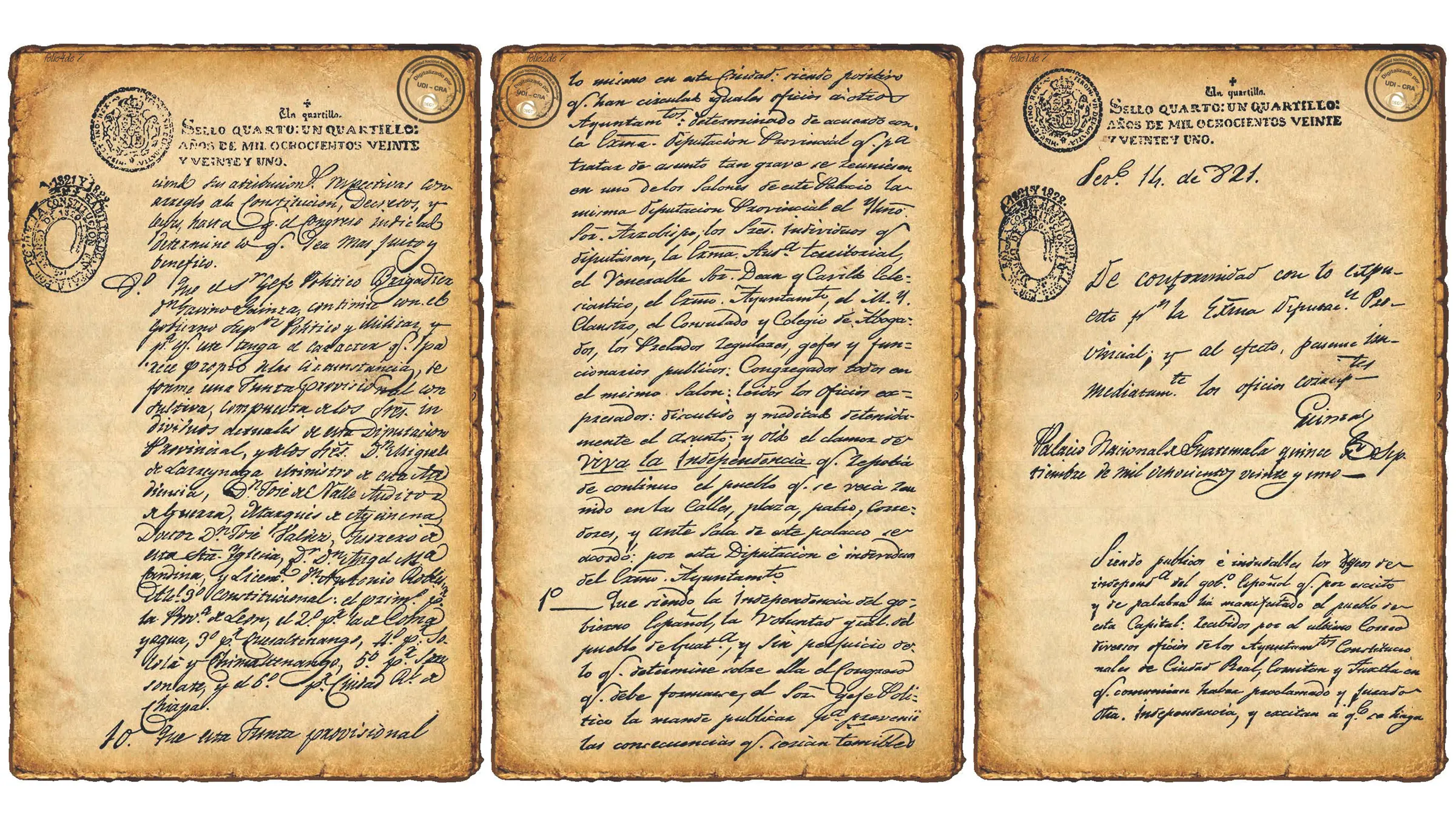Act of Independence of Honduras
Few people are familiar with the content of our Act of Independence of Honduras. Below, we can read the text of this momentous document that granted us freedom as a nation.
The meeting of the Deputation was chaired by the Superior Political Chief Gabino Gaínza, and the act was drafted by the celebrated Honduran intellectual and politician José Cecilio del Valle, with the assistance of indigenous scribes Lorenzo Romaña and Domingo Dieguez, according to Dr. Orlando Betancourth’s account. The session took place in the National Palace, which was located in what is now known as Parque Centenario in Nueva Guatemala de la Asunción. The original document is preserved in the General Archive of Central America in the same city.
The Intendency of San Salvador enthusiastically accepted the decision of the Guatemalan Deputation, and its act was supported by the Provincial Deputations of Comayagua (September 28) and Nicaragua and Costa Rica (October 11). However, these latter two provinces were reluctant to accept the authority of Guatemala.
On October 29, 1821, Emperor Agustín de Iturbide, through his chancellor or prime minister José Manuel de Herrera, sent a letter to the Captain General of the Provisional Advisory Board of Central America, Gabino Gaínza y Fernández de Medrano, whose board presided over the delegates representing the provinces of Chiapas, San Salvador, Honduras, Nicaragua, and Costa Rica. The letter proposed joining the Mexican Empire in accordance with the Three Guarantees of the Treaties of Córdoba.
Although one of the clauses of the Act of Independence stipulated the formation of a congress to «decide on the point of Independence and, if agreed upon, establish the form of government and the fundamental law to be chosen,» on January 2, 1822, by majority vote of the municipalities of the five provinces, with San Salvador being the main opposition to this decision and Costa Rica failing to reach a definitive agreement.
In fact, the province of Costa Rica at the time did not ratify its annexation to the empire as a result of the first Costa Rican civil war (Battle of Ochomogo). However, it sent a representative to the National Constituent Assembly, who later became a member of the Council of State of Emperor Agustín I (Florencio del Castillo). When Agustín de Iturbide abdicated the Mexican crown on March 19, 1823, the provinces separated, except for Chiapas, which joined the Mexican Republic as a federated state.

Act of Independence of the Captaincy General of Guatemala
(Now Guatemala, El Salvador, Honduras, Nicaragua, and Costa Rica)
«National Palace of Guatemala, Fifteenth of September, eighteen twenty-one.
Given the public and undeniable desires for independence from the Spanish government, which the people of this capital have expressed in writing and verbally: having received various letters from the Constitutional City Councils of Ciudad Real, Comitan, and Tuxtla through the last mail, in which they communicate the proclamation and oath of said independence and encourage the same to be done in this city: it is a fact that similar letters have been circulated to other City Councils: it was decided, in agreement with the Most Excellent Provincial Deputation, that for such an important matter, the Provincial Deputation itself, the Most Illustrious Archbishop, the members of the Most Excellent Territorial Audiencia, the Venerable Dean and Ecclesiastical Council, the Most Excellent City Council, the Illustrious University, the Consulate, the Illustrious Bar Association, the Regular Prelates, Chiefs, and public officials should meet in one of the halls of this palace: once all were gathered in the same hall, the aforementioned letters were read, the matter was discussed and carefully considered, and the clamor of Long Live Independence, which the people gathered in the streets, plaza, courtyard, corridors, and antechamber of this palace repeatedly shouted, was heard. The Provincial Deputation and members of the Illustrious City Council have thus resolved:
- That the independence of the Spanish government, which is the general will of the people of Guatemala, should be published by the Political Chief to prevent the potentially dire consequences of the people proclaiming it themselves.
- That immediate letters be circulated to the provinces, through extraordinary mail, urging them to promptly proceed with the election of their own Deputies or Representatives, who shall come to this capital to form the Congress that will decide on the point of general and absolute independence, and, if agreed upon, establish the form of government and fundamental law that shall govern.
- That to facilitate the appointment of Deputies, the same provincial electoral boards that conducted or were supposed to conduct the elections of the latest Deputies to the Cortes be entrusted with this task.
- That the number of Deputies be proportional to one per fifteen thousand individuals, without excluding those of African origin from citizenship.
- That the same provincial electoral boards, taking into account the latest censuses, determine, based on this criterion, the number of Deputies or Representatives to be elected.
- That, given the gravity and urgency of the matter, the elections be conducted in a manner that ensures that all Deputies are assembled in this capital by the first day of March of the following year, 1822.
- That in the meantime, with no changes made to the established authorities, they continue to exercise their respective functions in accordance with the Constitution, decrees, and laws until the aforementioned Congress determines what is most just and beneficial.
- That the Political Chief, Brigadier Don Gabino Gaínza, continue with the superior political and military government, and to bestow upon it the character appropriate for the circumstances, a Provisional Consultative Board shall be formed, composed of the current members of this Provincial Deputation, Don Miguel Larreynaga, Minister of this Audiencia, Don José del Valle, War Auditor, Marquis of Aycinena, Doctor Don José Valdés, Treasurer of this Holy Church, Doctor Don Ángel María Candina, and Licentiate Don Antonio Robles, 3rd Constitutional Mayor: the first representing the province of León, the second representing the province of Comayagua, the third representing Quezaltenango, the fourth representing Sololá and Chimaltenango, the fifth representing Sonsonate, and the sixth representing Ciudad Real de Chiapas.
- That this Provisional Board consult the Political Chief on all economic and governmental matters deserving of his attention.
- That the Catholic religion, which we have professed in previous centuries and will continue to profess in the centuries to come, be preserved pure and unaltered, keeping alive the spirit of religiosity that has always distinguished Guatemala, respecting secular and regular ecclesiastical ministers, and protecting them in their persons and properties.
- That communication be sent to the worthy Prelates of the religious communities, so that, contributing to the peace and tranquility that is the primary necessity of peoples when transitioning from one government to another, they instruct their members to promote fraternity and harmony among those united in the general sentiment of independence, urging them to be united in all other aspects as well, suppressing individual passions that divide spirits and produce disastrous consequences.
- That the Most Excellent City Council, entrusted with the preservation of order and tranquility, take the most active measures to maintain them undisturbed in this entire capital and its neighboring towns.
- That the Political Chief publish a manifesto, making known to all the general sentiments of the people, the opinions of the authorities and corporations, the measures of this Government, the causes and circumstances that led it, at the request of the people, to swear independence and loyalty to the American Government to be established, in the hands of the First Mayor.
- That the Provisional Board, the Most Excellent City Council, the Most Illustrious Archbishop, the Courts, the political and military chiefs, the regular Prelates, their religious communities, the chiefs and employees in the revenue offices, the authorities, corporations, and troops of the respective garrisons, all take the same oath of independence.
- That the Political Chief, in agreement with the Most Excellent City Council, organize the solemnity and designate the day on which the people shall make the aforementioned proclamation and oath of independence.
- That the Most Excellent City Council authorize the minting of a medal that shall perpetuate the memory of the Fifteenth of September, 1821, the day on which its glorious independence was proclaimed.
- That this act and the aforementioned manifesto be printed and circulated among the Most Excellent Provincial Deputies, the Constitutional City Councils, and other regular ecclesiastical, secular, and military authorities, so that, in agreement with the same sentiments expressed by this people, they may act in accordance with everything stated herein.
- That on the day designated by the Political Chief, a solemn thanksgiving Mass be celebrated, with the presence of the Provisional Board, all the authorities, corporations, and chiefs, accompanied by artillery salutes and three days of illumination.
National Palace of Guatemala, September 15, 1821.
Independence Heroes:
(SIGNATURES) GABINO GAINZA – MARIANO DE BELTRANENA – JOSE MARIANO CALDERON – JOSE MATÍAS DELGADO – MANUEL ANTONIO MOLINA – MARIANO DE LARRAVE – ANTONIO DE RIVERA – JOSE ANTONIO DE LARRAVE – ISIDORO DE VALLE Y CASTRICIONES – MARIANO DE AYCINENA – LORENZO DE ROMAÑA, SECRETARY – DOMINGO DIEGUEZ, SECRETARY.
Signatories
Guests at the session held on Saturday, September 15, 1821, at 9:35 a.m.:
Audience of Guatemala:
- Brigadier Gabino Gaínza, President (*)
- Francisco de Paula Vilches, Regent Oidor
- Lic. José Cecilio del Valle, War Auditor
- José Valdés Guzmán, Oidor
- Miguel Larreynaga, Oidor
- Miguel Moreno, Oidor
- Tomás Antonio O’Horán y Argüello, Auditor
- José Velasco, Director of Tobacco Revenue
- Antonio María Rivas, Royal Treasury Accountant
- Fernando Palomo, Excise Tax Accountant
- Pedro Delgado Nájera, Post Office Administrator
- Juan Bautista Jáuregui, Captain of Engineers
- Lorenzo de Romaña, Government Secretary (*)
Provincial Deputation
- Mariano Beltranena y Llano (*)
- José Matías Delgado (*)
- José Mariano Calderón (*)
- Manuel Antonio de Molina (*)
- Antonio Rivera Cabezas (*)
- José Domingo Diéguez, Secretary (*)
City Council of Nueva Guatemala de la Asunción
- Mariano de Larrave, First Mayor (*)
- Mariano de Aycinena y Piñol, First Syndic (*)
- Pedro de Arroyave, Second Syndic (*)
- José Antonio de Larrave, Councilor (*)
- Isidoro del Valle y Castriciones, Councilor (*)
Catholic Church
- Ramón Casaus y Torres, Archbishop
- Antonio García Redondo, Dean
- José María Castilla, Provost and Vicar General
- Francisco Algarín, Augustinian
- Luis Escoto, Dominican
- Luis García, Mercedarian
- Mariano Pérez de Jesús, Recoletan
- Juan de San Diego, Bethlehemite
- José Antonio Taboada, Franciscan
- Juan José Batres, San Sebastián
- Enrique de Loma, Candelaria
- Ángel María Candina, Los Remedios
- Víctor Castillo, La Merced
University of San Carlos of Guatemala
- Antonio de Larrazábal y Arrivillaga, Rector
- Serapio Sánchez, Faculty
- Mariano Gálvez, Faculty
Consulate of Commerce
- Francisco de Arrivillaga
Guatemala Bar Association and Notaries
- José Francisco Córdova
- Santiago Milla
Military Bodies
- Colonel Javier Barrutia
- Officer Mariano de Asturias
- Officer José Ignacio Larrazábal
- Officer Rafael Montúfar
- Officer Domingo Ariza
- Officer Félix Lagrava
- Officer Francisco Taboada
- Colonel Manuel Arzú
- Officer José Villafañe
- Militia Sergeant Antonio Arzú
In addition to the official attendees, in the antechamber of the Royal Palace were the Third Marquis of Aycinena, Priest Juan José de Aycinena y Piñol, José Francisco Barrundia y Cepeda, Pedro Molina Mazariegos, Basilio Porras, and María Dolores Bedoya. The treasurer, Manuel Vela, would later describe them as a gang of bought men. The crowd in attendance demanded from the representatives of the various institutions the political emancipation of the Kingdom of Guatemala.
(*) The thirteen original signatories of the Act of September 15, 1821.
What does the Act of Independence of 1821 say?






In addition
- Arrival of the Independence documents from Honduras
- History of the Declaration of Independence of Honduras
- National Heroes and Patriotic Symbols of Honduras
Source: National Autonomous University of Honduras (UNAH)


